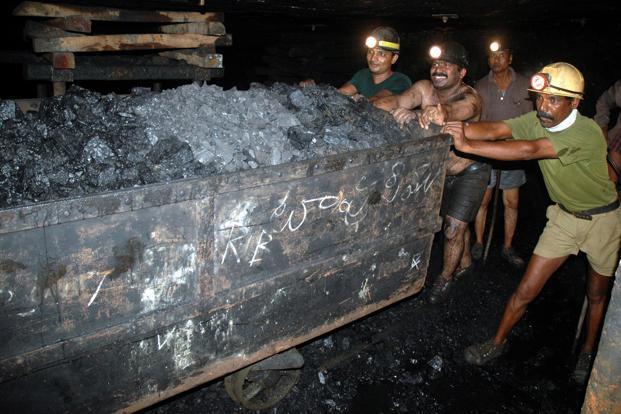Dangers beyond mines for coal mine workers in India

In 2004, coal mines accounted for 81 pc of accidents, 60 pc of deaths & 83 pc of injuries of total mining disasters (Image Credits: AFP/Getty Images)
“Coal mining continues to be one of the most hazardous professions in our society. Even today, coal miners continue to face a work environment that is inherently toxic and unhealthy. Coal miners walk away with significant health impairments and shorter life expectancies than others,” says Dr Suresh Sampat, a private practitioner in Jharkhand’s Dhanbad, one of the biggest coal mining areas in Idia. Dr Sampat says he has seen over a thousand cases of diseases and early deaths of coal mine workers in the state, that could have been prevented with proper safety equipment and regular health check-ups.
He goes on to say that coal mining is one of the most hazardous industries, despite being a very large employer. Apart from long-term health issues, mines in India are also responsible for many accidents and loss of lives. According to an estimate by the Directorate General of Mines Safety, mine accidents cause numerous deaths every year. From June 2016 to June 2019, a total of 417 miners were killed in fatal mine accidents, with 238 of the victims being coal miners.
According to a more recent report by Down To Earth, an Indian magazine focused on politics of environment and development, on an average, there are currently around 0.3 deaths in coalmines per 1,000 employees in India.
For each million tonnes of coal produced, 24 times as many miners die in India as in Australia, while it is 16-times as much as the United States. Not just globally, Indian coal mines are more accident prone than those of other minerals and metals. In 2004, coal mines accounted for 81 pc of accidents, 60 pc of deaths and 83 pc of injuries of the total mining disasters. This, after accidents in coalmines have actually dropped after the nationalisation of coal sector in the 1970s. In India, underground coalmines accounted for 54 pc of the total casualties. Jharkhand has the highest fatality record 26 pc (in 2001). “Despite the alarming numbers here, one must also remember that these are the ones that got reported. I am sure the actual number might be three or four times higher,” says Dr Sampat.
Sambhu Ram, 38, works in a company that provides workers to Bharat Coking Coal Limited (BCCL) in Jharkhand’s Dhanbad district. He earns a meagre INR 310 per day. Ram, a resident of Jharia in Jharkhand’s Dhanbad district, is the sole bread earner for his family of seven.
He lives in a thatched house with his parents, wife and three children. For about a month during the national lockdown imposed in March, 2020, Ram went through an acute financial crisis as he struggled to find mining jobs due to a drop in demand.
“I had only little savings that I exhausted to buy basic amenities during the lockdown. However, things returned to normalcy after outsourcing work started again,” he said.
He works in an opencast mine in Jharia and as a daily wager, he is dependent on the work he gets every day. “The first 20 days were very tough, as I could not understand how to feed my family. There was no work in the market,” he said.
Jharkhand has three big coal companies – Bharat Coking Coal Limited (BCCL), Central Coalfields Limited (CCL) and Eastern Coalfields Limited (ECL). Most of the companies saw their profits dip this year, despite a significant recovery in the second half of the year.
While Ram is dissatisfied with the payment and benefits he is being provided with, another mine worker, 46-year-old Shyamal Majhi, who works at a private coal mining company, Kerwa Coal Limited, in Chhattisgarh’s capital Raipur, says that while he and 70 others that go down the mines every day have life as well as health insurance, his peers working in other companies lack even the basic safety equipment, let alone insurance covers.
“A friend of mine lost his legs in a coal mine accident, about three years ago. Though he received compensation from the company, it was not enough to bear even the cost of his hospital services. It was provided just for the sake of it,” he adds.
He goes on to say that the company had agreed that if for some reason, he is unable to work, his son will be given a job so that their family income stays stable. However, due to the absence of any written agreement, this did not happen. Daily wage workers, hired on contract, do not enjoy any health insurance, provident fund, gratuity, minimum wage or pension. “Government should ensure decent wages at least,” he says.
Nidhi Sharma, a worker of Labourall organisation, a Delhi-based NGO that works for the rights of daily wage labourers and unorganised workers, says that “Coal mine workers, like most daily wage workers, are not very educated. Most of the labourers who work are not aware of the health risks involved in working in the mines, nor about their rights vis a vis safety and health. As companies try to maximise their profit, the daily wagers become the easiest target of exploitation for them,” adds Sharma.
Sharma also worries about the future of coal mine workers as there is a growing global pressure on India to announce a deadline for phasing out coal usage after China in September 2020 declared that it will stop coal usage by 2050.
“Coal is considered the biggest emitter of carbon dioxide that causes climate change. Though it is unlikely to happen in near future, I fear that millions of jobs will be jeopardised. I hope that the Centre will provide social and job security to casual workers hired from contractors. We want equal pay for equal work for coal miners, insurance and other safety benefits,” she says.









